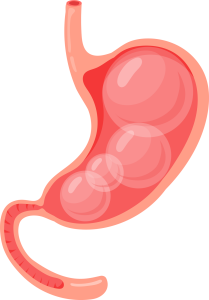Entering the 40s is a significant milestone, bringing wisdom and changes in the body, particularly in digestive health. While focusing on heart health, bone density, and cognitive well-being is common, it’s essential to recognize digestive health’s role in overall wellness. Let’s explore the challenges faced by those in their 40s and beyond and provide actionable steps to maintain optimal digestive well-being.
Understanding Digestive Changes with Age:
As the journey through life progresses, our digestive system encounters many transformations, such as:
1. Decline in Digestive Enzymes:
One of the digestive system changes as we grow is the gradual decline in the production of digestive enzymes. These enzymes, including amylase, protease, and lipase, are crucial in breaking down carbohydrates, proteins, and fats. The diminishing levels of these enzymes can result in a slower and less efficient breakdown of nutrients, potentially leading to digestive discomfort and nutrient absorption challenges.
2. Reduced Gut Function (Movement):
Aging muscles in the digestive tract may experience a reduction in gut movement, meaning the contractions that move food through the digestive system become less robust. This decline can contribute to sluggish digestion and sometimes lead to issues such as constipation. Maintaining optimal gut motility is fundamental for the timely and effective processing of ingested food.
3. Alterations in Gut Microbiota:
The gut microbiota, a diverse community of microorganisms in the digestive tract, changes with age. The balance between beneficial and harmful bacteria may shift, impacting various aspects of health. This alteration can influence digestive processes, immune function, metabolism, and cognitive health.
4. Stomach Acid Changes:
Aging involves a decrease in stomach acid production. This hydrochloric acid, essential for protein breakdown and nutrient absorption, experiences a decline. This decrease can impede the efficient breakdown of dietary proteins and absorption of essential nutrients, potentially leading to malnutrition.
5. Medication Impact:
With age often comes an increased reliance on medications, some of which directly or indirectly affect digestive health. Common medications, including proton pump inhibitors and antibiotics, are known to disrupt natural stomach acidity levels and the balance of gut bacteria.
Nutritional Strategies for Digestive Wellness:
Safeguarding digestive wellness in your 40s and beyond necessitates a thoughtful and nutritionally sound approach. Consider these strategies to fortify your digestive system.
- Balanced Diet: A balanced and nutrient-dense diet is at the heart of digestive well-being. Emphasize including high-fiber foods, such as whole grains, fruits, and vegetables. Fiber is pivotal in maintaining regular bowel movements, preventing constipation, and fostering a thriving gut microbiota. Opt for various colors on your plate, ensuring a spectrum of vitamins, minerals, and antioxidants essential for overall health.
- Hydration: Adequate hydration is a cornerstone of optimal digestion. Water plays a critical role, facilitating food movement through the digestive tract, aiding in the absorption of nutrients, and ensuring the smooth functioning of various digestive processes. As part of your digestive wellness strategy, consciously maintain proper hydration throughout the day. Water-rich foods, such as cucumbers and watermelon, can also contribute to your overall fluid intake.
- Limit Processed Foods: Processed foods, often laden with artificial additives, preservatives, and refined sugars, can challenge the digestive system. These foods may be harder to digest, potentially leading to discomfort, bloating, and irregular bowel movements. Limiting the intake of processed foods is a crucial step in supporting digestive health. Instead, opt for whole, unprocessed foods that provide essential nutrients without the burden of added chemicals. This shift in dietary choices contributes to digestive wellness, nutritional intake, and health.
- Mindful Eating Practices: Beyond the content of your diet, how you eat can significantly impact your digestive processes. Cultivate mindful eating habits by savoring each bite, chewing food thoroughly, and paying attention to hunger and fullness cues. Eating in a relaxed environment and avoiding distractions like electronic devices fosters a positive and unhurried eating experience. These practices enhance the digestive process and promote a healthier relationship with food.
- Digestive Enzymes Supplementation: Consider incorporating digestive enzyme supplements to aid in the breakdown of nutrients and enhance digestion. Goodness Digestive Enzymes, specifically tailored to the aging gut, can be valuable.
Lifestyle Practices for Digestive Well-being:
Achieving and maintaining optimal digestive health extends beyond dietary considerations; it encompasses lifestyle practices that promote holistic well-being. Here’s an in-depth exploration of lifestyle practices essential for digestive wellness, especially in your 40s and beyond.
- Regular Exercise: Physical activity is a cornerstone of digestive well-being. Engaging in regular exercise not only supports overall health but also plays a direct role in promoting gut motility. Exercise stimulates the muscles of the digestive tract, facilitating the movement of food through the system. Additionally, it contributes to the prevention of conditions like constipation. Integrating a mix of aerobic exercises, strength training, and flexibility exercises into your routine provides a well-rounded approach to supporting digestive health. The positive effects of exercise extend beyond the physical, fostering a sense of well-being that resonates throughout the body.
- Stress Management: Chronic stress can exert a profound impact on digestive function, leading to issues such as indigestion, bloating, and changes in bowel habits. Incorporating stress management practices into your daily routine is crucial for digestive well-being. Mindfulness, yoga, meditation, and deep-breathing exercises effectively reduce stress levels. These practices address the psychological aspects of stress and have physiological benefits on the digestive system. By managing stress, you create a harmonious environment for optimal digestive function, mitigating the potential impact of stress-related digestive concerns.
- Adequate Sleep: Quality sleep is a non-negotiable component of overall health, and its significance extends to digestive well-being. During sleep, the body undergoes essential vital processes, including digestion-related. Disruptions in sleep patterns have been linked to alterations in gut microbiota and an increased susceptibility to digestive issues. Therefore, prioritizing adequate and quality sleep is fundamental to supporting your digestive system. Establishing a consistent sleep schedule, creating a conducive sleep environment, and adopting relaxation rituals before bedtime improve sleep hygiene and enhance digestive wellness.
- Regular Check-ups and Screenings: Regular check-ups and screenings are pivotal in the early detection and proactive management of digestive concerns in pursuing holistic health. As we age, the importance of preventive healthcare measures becomes even more pronounced. Here’s an in-depth exploration of the significance of regular check-ups and screenings in safeguarding digestive well-being, particularly in your 40s and beyond.
- Schedule Routine Check-ups: Regular visits to healthcare professionals are foundational for maintaining overall health, specifically focusing on digestive wellness. These routine check-ups allow healthcare professionals to assess your health status comprehensively. During these appointments, discussions about diet, lifestyle, and any digestive symptoms you may be experiencing can take place. Establishing a consistent check-up schedule can identify potential issues early, allowing for timely intervention and personalized recommendations to optimize digestive health.
- Consider Screenings Such as Colonoscopies: In addition to routine check-ups, certain screenings become increasingly relevant as you age, serving as proactive measures for the early detection of potential digestive concerns. Colonoscopies, for instance, are recommended screenings that play a crucial role in preventing and detecting colorectal cancer and other gastrointestinal conditions. These screenings are typically recommended starting around 50, although individual risk factors and family history may influence the timing. Colonoscopies enable healthcare professionals to identify precancerous or cancerous growths in the colon, offering a window for preventive measures or early treatment. Discussing the appropriate screenings with your healthcare provider ensures a tailored approach based on your health profile.
The Role of Goodness Digestive Enzymes:
Explore the benefits of Goodness Digestive Enzymes, designed to address specific challenges faced by individuals in their 40s and beyond. These supplements can aid in efficiently breaking down proteins, fats, and carbohydrates, supporting nutrient absorption.
Taking proactive steps to care for your digestive health in your 40s and beyond is essential for overall well-being. You can support optimal digestive function by understanding the challenges, making informed nutritional choices, incorporating supplements like Goodness Digestive Enzymes, and adopting a healthy lifestyle. Remember, investing in digestive health is an investment in your long-term vitality and quality of life.
-
Product on sale
 Goodness Digestive EnzymesOriginal price was: $ 29.95.$ 25.95Current price is: $ 25.95.
Goodness Digestive EnzymesOriginal price was: $ 29.95.$ 25.95Current price is: $ 25.95.






